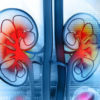Heel Pain Treatment in Northern NJ
 Patients with heel pain impacting their daily activities may need treatment to get back to pain-free movement. Bergen Medical Associates is a multi-specialty provider serving northern New Jersey with comprehensive medical care, including podiatry care and heel pain treatment. Learn more about heel pain, its causes, and treatment options from the practitioners at Bergen Medical Associates.
Patients with heel pain impacting their daily activities may need treatment to get back to pain-free movement. Bergen Medical Associates is a multi-specialty provider serving northern New Jersey with comprehensive medical care, including podiatry care and heel pain treatment. Learn more about heel pain, its causes, and treatment options from the practitioners at Bergen Medical Associates.
What Is Heel Pain?
The heel is the largest bone in the foot, playing an important role in a person’s walking mechanics and weight-bearing abilities. The heel hits the ground first when walking and can handle a lot of stress, but too much can result in heel pain. Pain in the heels is a common foot complaint and can occur in the front, back, or bottom of the heels. The symptoms include:
- Swelling
- Tenderness
- Bony growth or thickening on the heel
- Discoloration
- Stiffness
- Pain after getting up from a seated position
Heel pain can be gradual or more intense after activity and can range from mild to severe.
What Are the Causes and Risk Factors of Heel Pain?
Heel pain can happen to anyone and has several causes. However, certain causes and risk factors may make a person more likely to get heel pain. These include:
Anatomy
Sometimes, heel pain can be caused by a person’s anatomy or walking mechanics. People who walk with an abnormal gait or have flat feet often experience heel pain because of the greater stress placed on the heels.
Overuse
Heel pain is often caused by overuse of the feet, whether from running, walking, or another activity. These activities tend to impact heel pain more if they are completed daily or for many hours a day. Activities involving hard surfaces like concrete may also cause pain. Overuse of the foot muscles can lead to tightness in the calves or Achilles tendons, amplifying heel pain.
Injury
A common cause of heel pain is stress from an injury, whether from sports, normal activity, or wear and tear. This stress can happen when:
- Landing hard or awkwardly on the heel
- Sudden inward or outward turning of the heel
- Stepping on a hard object
These injuries can turn into a bone bruise, which causes heel pain. Stress fractures and nerve inflammation are other injuries that can cause heel pain, often brought on by repetitive, high-stress activities.
Medical Conditions
Certain medical conditions can put a person at a higher risk of developing heel pain. These include:
- Achilles tendinitis: Inflammation of the Achilles tendon, often from overuse, can lead to pain, swelling, and stiffness in the back of the heel.
- Bursitis: Fluid-filled sacs called bursae that cushion the joints can become inflamed, leading to a tender, bruised feeling in the back of the heel.
- Haglund’s deformity: A bone enlargement can form at the back of the heel from chronic inflammation, making pain worse when wearing certain shoes and with some activities.
- Sever’s disease: Sever’s disease (calcaneal apophysitis) is a cause of heel pain in active kids, especially those who do vigorous activities like running and jumping.
- Plantar fasciitis: Plantar fasciitis is a condition in which the connective tissue on the bottom of the feet becomes overstretched and inflamed, leading to pain.
Other possible causes of heel pain include rheumatoid arthritis, neuroma, or another soft-tissue growth. Certain risk factors can also put a person at an increased chance of having heel pain, including wearing non-supportive footwear, being overweight, and standing for long periods.
How Is Heel Pain Diagnosed?
Since heel pain can be caused by a range of conditions and factors, patients with persistent heel pain should consult their doctor or podiatrist to rule out other causes. The doctor will first look at the patient’s medical history and examine their feet, checking for swelling, discoloration, anatomical issues, flexibility, and pain.
Generally, these examinations will give enough insight into the cause of the pain. However, sometimes imaging scans such as X-rays are used to check for other damage or symptoms not visible to the naked eye.
What Are Heel Pain Treatment Options?
Luckily, heel pain usually improves over time without invasive treatments. Some common treatment suggestions for heel pain include:
- Icing the affected area twice a day to reduce swelling
- Taking over-the-counter medications for pain relief
- Resting the feet for a while
- Using orthotics, heel cups, or night splints for additional support
- Wearing well-fitting, supportive shoes with ample arch support and cushioning
- Stretching calves, ankles, and feet before and after exercise
- Taping the affected area with athletic or medical tape for support
These mild treatments are often enough to relieve heel pain, but more severe cases may require treatments like steroid injections or even surgery to fix the underlying cause.
Request a Bergen Medical Associates Podiatry Appointment Today
Patients experiencing heel pain that interferes with their daily lives can access a customized care plan from the specialists at Bergen Medical Associates. With a podiatry team led by Samantha Rosenzweig, DPM, and six locations throughout northern New Jersey, Bergen Medical Associates is a trusted place to go for podiatry and other healthcare needs. To learn more about heel pain treatment options or to request an appointment, contact us today.










